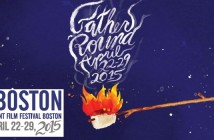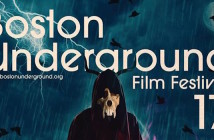
Editor’s Notes: The Toronto Screenwriting Conference (TSC) is a two-day weekend event on April 11th & 12th that brings together screen-based industry professionals and offers them advanced education and skills development unparalleled by any other screenwriting event on the continent. For more information visit www.torontoscreenwritingconference.com.
Every April for the last 6 years, screenwriters - from the established to the aspiring – have convened at a local venue that, for two days, houses some of today’s top working screenwriters in the film and television industry. This assembly of scribes makes up the Toronto Screenwriting Conference (TSC), which was hosted last weekend at Daniels Spectrum in Regent Park here in Toronto. Previous years have welcomed guests of the likes of Michael Arndt (Toy Story), David Webb Peoples (Unforgiven), Glen Mazzara (The Walking Dead), and Beau Willimon (House of Cards).
Writers of many types gathered to network and, more importantly, attentively soak in the many masterclasses the conference had to offer. Special guests this year included the likes of David S. Goyer (Man of Steel, Da Vinci’s Demons) and Eugene Levy and Dan Levy (Schitt’s Creek). Those were what some may call the “marquee names” at the conference, and their sessions opened both days, Goyer on Saturday morning and the Levy’s Sunday morning. Early risers waddled into the 300-seat Ada Slaight Hall to hear these craftsmen speak. Goyer’s segment was called “Crafting Mythic Stories”, which discussed (everyone’s favourite) screenplay structure and the importance of universal themes.
I managed to attend “Checking in with Eugene and Dan Levy”, which was a fairly laid-back 90-minute talk about the writing process of the new CBC series, Schitt’s Creek. Dan did most of the talking, while father Levy deferred most of the credit to his son in that warmly sincere way you might expect of Jim’s Dad from the American Pie movies. When questions opened to the floor, this writer asked the Levy’s about the origins of the show’s quippy title. Eugene was – amazingly – the one to quickly field this. He mentioned going on cottage trips with his friend and, while basking by the lake, brainstorming quirky names of small towns. Of all of them, “Schitt’s Creek” took the cake.
Probably the best session I attended was “Setting the Scene” with Ted Braun, the American documentarian responsible for 2007’s Darfur Now. Although spectators were crammed into the 120-seat Aki Studio space, they were blessed by Braun’s natural pedagogic skills. He created a clear line of communication between himself and the audience. He did not make the seminar about himself, but rather made it an open discussion for attendees, even those tucked in the corner who were unable to nab a seat, to readily chime in. We looked at clips from Midnight Cowboy, Five Easy Pieces, All the President’s Men (notice a New Hollywood trend here?) and parsed out the direct and indirect conflicts of the chosen scenes. It was a very insightful dialogue.
The majority of the TSC, however, was spent in the Artscape Lounge, the “living room” of the building, where delegates could enjoy complimentary drinks and network till their throats were sore and pockets deprived of business cards. This space had more of an open-concept feel compared to the Ted Roger’s School of Management, which hosted the conference in previous years. It was a very relaxing atmosphere and, speaking candidly, I spent most of my time in between and during some of the seminars lounging in that area of the building mixing in with fellow delegates and cordial volunteers.
On Sunday, the ceremonies concluded with “Notes on Feature X’’, the one session offered every year at the TSC. It takes a screenplay (that all delegates are emailed beforehand) and a panel of industry people – this year there was Warren Sonada, Christina Kubacki, David Miller, Aaron Poole, and moderator Steve Hoban – providing feedback to the screenplay’s writer, who is revealed at the beginning of the session. In the opposite auditorium, Jay Bennett moderated a discussion with Katja Blichfeld and Ben Sinclair, whose web series High Maintenance established a cult following over the video-sharing website, Vimeo.
Now in its sixth year, the TSC continues to improve in the diversity of its seminars and the quality of its amenities. What also really worked about hosting the event in Daniels Spectrum is that everything was contained in one place, eliminating some of the discombobulation that occurred in previous years – like when the end-of-day social was hosted offsite. The only benefit of that experience is I now know where “Mr. Green Jeans” is.
There was a sense of unity this time around, making this one of the TSC’s most successful events. With a variety of guest speakers, delegates’ interests did not have to be restricted to screenwriting for them to feel their experience was worthwhile. In fact, one had to prioritize their seminars and choose, for example, if you wanted to see Carole Kirschner answer the eternal question “You Have A Great Script, Now What?”, you had to forgo Corey Mandell’s enlightening talk about “Creating A Successful TV Series Engine”.
What’s next for the TSC? Well, one can only wait. It is simply of seeing what next April will provide – and what veteran writers will heed this conference’s call. And I suppose the final question is… will you?




Pingback: Blue Coaster33()
Pingback: how to loose weight()
Pingback: tv online, online tv()
Pingback: watch free movies online()
Pingback: watch movies online()
Pingback: alkaline water()
Pingback: best bottled water()